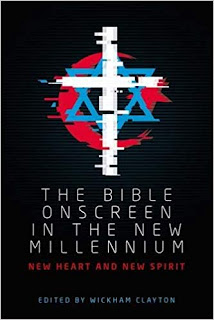Book Review: "The Bible on the Big Screen - A Guide from Silent Films to Today's Movies"
 Whilst there have been numerous books written in recent years about film portrayals of Jesus, books examining Bible movies in general have been somewhat thinner on the ground. Aside from Richard H. Campbell and Michael R. Pitts' seminal "The Bible on Film: A Checklist 1897-1980", and Bruce Babington and Peter W. Evans' impressive "Biblical Epics: Sacred Narrative in the Hollywood Cinema", books about films about the Hebrew Bible have either just looked at one particular film, or have been only a small part of a larger work detailing Hollywood's record of world history.
Whilst there have been numerous books written in recent years about film portrayals of Jesus, books examining Bible movies in general have been somewhat thinner on the ground. Aside from Richard H. Campbell and Michael R. Pitts' seminal "The Bible on Film: A Checklist 1897-1980", and Bruce Babington and Peter W. Evans' impressive "Biblical Epics: Sacred Narrative in the Hollywood Cinema", books about films about the Hebrew Bible have either just looked at one particular film, or have been only a small part of a larger work detailing Hollywood's record of world history.As a result, J. Stephen Lang's "The Bible on the Big Screen - A Guide from Silent Films to Today's Movies" is most welcome. Lang has already written an impressive number of books ranging from his "Complete Book of Bible Trivia" (which has sold 600,000 copies) to his "Complete Idiot's Guide to The Confederacy". He's clearly an author who relishes the challenge of a good research project.
Lang shapes his material around 8 eras in cinematic history: up to 1912, the remaining silent period from 1912-1929, The "lean years" of the 30s and 40s, the "golden 50s, the "silver age" of the 60s, the 1970s, the controversy of the 80s and 90s, and the films of the new millennium. Chapters start with a general overview before focussing on the major Bible films from each period. This enables Lang to discuss 35 films to a fairly good level of detail, whilst also making passing comments on numerous others.
No selection is perfect - what is omitted always leaves someone scratching their head - but Lang's is pretty robust. He omits films released straight to DVD, TV movies (with the exception of Jesus of Nazareth) and films that have been specifically for church groups, as well as films that offer a less-direct interpretation of the biblical text (such as Jesus of Montreal). As a result he has space to include a handful of interesting choices such as Michael Grampus' The Passover Plot and Roberto Rossellini's Il Messia.
There's perhaps also been a shortage of books written in this area for and/or by evangelicals. Whilst there's no direct evidence of Lang's theological affiliation, he certainly appears to be an evangelical protestant. He loves Jesus of Nazareth and The Ten Commandments (1956), and hates Jesus Christ Superstar and Life of Brian. He's particular concerned with where the films deviate from the biblical text, makes passing comments about "liberals"1, and keenly defends the Gospels from charges of anti-Semitism.2 As a result his work also seems to fill this other void in the Bible films books market.
It's perhaps the combination of Lang's love of research and his evangelicalism which results in his reviews of these films focussing largely on their plots. Lang's detailed discussion of each individual plot often makes up the majority of the film's analysis. Whilst this approach leaves little doubt as to what happens in each story, which those who have not seen the film in question may find useful, it makes for dull, laborious reading for everyone else. That said, from time to time his writing style flourishes a bit as he discovers he has more to say than simply reciting the details of every scene. This is particularly evident with some of the more recent films which he has clearly enjoyed. Lang also seems unhappy with films that use a lot of artistic licence, although, to his credit, he is able to see the strengths of Last Temptation of Christ as well as its flaws.
There are also a couple of lesser problems. Lang has clearly got access to a great body of research, but he only occasionally references it. This means that although there are several interesting asides, the reader is unable to follow them up further. There's also some unnecessary repetition, occasionally occurring just a few pages of the original statement.3 Finally, various minor errors are present, for example Lang misses the oft discussed misquote of Lev 25:10 in The Ten Commandments (1956)4, and gives the number of Philistine foreskins that David was required to fetch (1 Sam 18:25) is given as 400 rather than 1005, (to name but two).
None of this changes the fact that this book is a must-have for anyone who is interested in the cinematic interpretation of the Hebrew Bible. Whilst its writing style is somewhat stodgy, it offers the only detailed, in-print, discussion of several important Biblical movies.
1 - e.g. p.51 and p.54.
2 - pp.22-25 in particular, but anti-Semitism is discussed throughout.
3 - e.g. discussion about Michael Curtiz on pages 48 and 55, or D.W. Griffith's omission of "Go, and sin no more" (John 8:11) on p.51 and p.54.
4 - p.130
5 - p.237
Labels: Books













3 Comments:
At 10:44 pm, September 03, 2007, Doug said…
Doug said…
Can I ask a question? It sounds from your review as though he doesn't spend much time discussing the films as audio-visual texts, rather than as scripts. Is this so?
At 5:46 pm, September 04, 2007, Matt Page said…
Matt Page said…
That's probably a fair way of putting it. There are a few comments on the audio-visual aspects of the films - perhaps the odd phrase in the middle of the plot outline, but I think I would have preferred it if there was a bit more of that.
Matt
At 9:50 pm, September 04, 2007, Doug said…
Doug said…
Thanks. That's helpful.
Post a Comment
<< Home